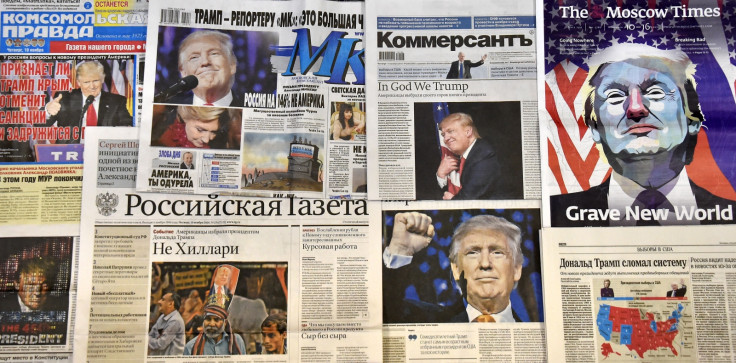Russian propaganda campaign helped drive the spread of 'fake news' during US election, experts say
Researchers said the propaganda campaign churned out misleading articles to 'sow distrust' in US democracy.

A sophisticated Russian propaganda campaign that churned out misleading articles online helped drive the spread of "fake news" during the US election season, the Washington Post reported, citing independent researchers who followed and analysed the activity. According to researchers, the Russian campaign churned out misleading articles online created to target Democratic candidate Hillary Clinton, help Republican rival Donald Trump's campaign and "sow distrust" in American democracy, the Post reported.
Two independent research teams found that Russia used thousands of bots, paid online human "trolls" as well as "honeypot" social media accounts and websites to disseminate manipulated or skewed content and give weight to right-wing websites and content online.
"They want to essentially erode faith in the US government or US government interests," Clint Watts, a fellow at the Foreign Policy Research Institute, who tracked Russian propaganda operations since 2014 with two other researchers, told the Post. "This was their standard mode during the Cold War. The problem is that this was hard to do before social media."
According to a report published by Watts and two colleagues, Andrew A Weisburd and J M Berger, on the national security blog War on the Rocks, Russia's alleged efforts to influence the election were not just to help Trump win, but to "produce a divided electorate and a president with no clear mandate to govern."
"The ultimate objective is to diminish and tarnish American democracy," the analysts wrote in a post titled, 'Trolling for Trump: How Russia is trying to destroy our democracy.' "Unfortunately, that effort is going very well indeed. Russia's desire to sow distrust in the American system of government is not new. It's a goal Moscow has pursued since the beginning of the Cold War.
"Its strategy is not new, either. Soviet-era 'active measures' called for using the 'force of politics' rather than the 'politics of force' to erode American democracy from within. What is new is the methods Russia uses to achieve these objectives."
The Post cited another report from PropOrNot, provided to the publication before its public release on Friday (25 November), that identified over 200 websites that continued to publish Russian propaganda over the course of the election campaign season to at least 15 million Americans. Fake news stories that were promoted on Facebook were viewed over 213 million times.
A recent study found that fake news stories got more engagement on Facebook than real news during the last three months of the election season.
Russia's propaganda campaign during the recent race to the White House reportedly worked due to the internet's appetite for "buzzy" content that may be shocking, emotional or tied to popular conspiracy theories, the Post reports.
Researchers also found that some stories also came from state-funded Russian news agencies RT and Sputnik that featured false or misleading stories in their coverage at times. Along with other Russian websites, these agencies also used social media platforms to promote misleading news stories that were already making the rounds online and trick news algorithms into identifying them as "trending topics."
On Wednesday, the European Parliament called for the EU to combat "hostile propaganda" by the Kremlin and approved a resolution that criticised news agencies such as RT and Sputnik for spreading "absolutely fake" news. President Vladimir Putin quickly slammed the European Parliament for "trying to teach us democracy."
In October, Washington formally accused Moscow of hacking into the computers of the Democratic National Committee (DNC) and targeting various US political organisations through cyberattacks in an attempt to meddle in the presidential election. Clinton's campaign also blamed Russia for hacking into campaign chair John Podesta's personal account and the subsequent near-daily publication of damaging emails by WikiLeaks, claiming that Putin was attempting to sway the election in favour of Donald Trump.
The Kremlin, on the other hand, has continued to dismiss the allegations of interference in the US elections.
"The way that this propaganda apparatus supported Trump was equivalent to some massive amount of a media buy," the executive director of PropOrNot told the Post on the condition of anonymity. "It was like Russia was running a super PAC for Trump's campaign... It worked."
© Copyright IBTimes 2025. All rights reserved.





















